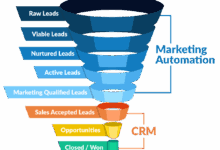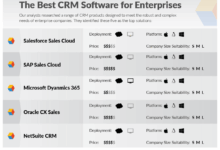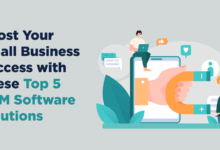AI-Powered CRM Software: A Comprehensive Guide
AI-Powered CRM Software is revolutionizing how businesses manage customer relationships. No longer are CRM systems simply databases; they are now intelligent platforms leveraging artificial intelligence to predict customer behavior, automate tasks, and personalize interactions. This guide delves into the core functionalities, benefits, and challenges of implementing AI-powered CRM solutions, exploring how they enhance traditional systems and drive significant improvements in sales, marketing, and customer service.
We will examine key AI features, such as predictive analytics and AI-driven automation, and showcase real-world case studies illustrating the impact of AI-powered CRM across various industries. Furthermore, we will address crucial considerations, including data security, ethical implications, and future trends shaping the landscape of customer relationship management.
Defining AI-Powered CRM Software
AI-powered CRM software represents a significant advancement in customer relationship management, leveraging artificial intelligence to automate tasks, analyze data, and provide actionable insights that traditional CRM systems cannot. It streamlines operations, improves efficiency, and ultimately fosters stronger customer relationships.
AI enhances traditional CRM systems by automating repetitive tasks such as data entry and lead qualification, freeing up human agents to focus on more strategic activities. It provides predictive analytics, forecasting future trends and customer behavior, allowing businesses to proactively address potential issues and capitalize on opportunities. Furthermore, AI-powered CRM systems offer personalized customer experiences through sophisticated segmentation and targeted marketing campaigns.
Key Differences Between AI-Powered CRM and Standard CRM Solutions
AI-powered CRM solutions differ from standard CRM systems primarily in their ability to learn and adapt. Standard CRMs primarily store and manage customer data, offering basic reporting and analytics. AI-powered CRMs go beyond this, using machine learning algorithms to identify patterns, predict outcomes, and automate complex processes. This results in more accurate forecasting, improved customer segmentation, and a more personalized customer journey. The integration of AI also leads to increased efficiency and reduced operational costs. For instance, AI can automate lead scoring, prioritizing high-potential leads for sales teams, saving valuable time and resources.
Comparison of Leading AI-Powered CRM Platforms
The following table compares three leading AI-powered CRM platforms based on their unique selling propositions. These platforms offer varying strengths depending on specific business needs and priorities.
| Platform | Unique Selling Proposition | Key Features | Target Audience |
|---|---|---|---|
| Salesforce Einstein | Predictive analytics and intelligent automation across the entire Salesforce ecosystem. | Lead scoring, opportunity scoring, intelligent recommendations, and automated workflows. | Businesses of all sizes, particularly those already using the Salesforce platform. |
| Microsoft Dynamics 365 AI | Integration with Microsoft’s broader suite of applications, offering a seamless experience for users. | Predictive lead scoring, intelligent chatbots, and automated insights across sales, marketing, and customer service. | Businesses that heavily utilize the Microsoft ecosystem. |
| HubSpot CRM with AI | Focus on inbound marketing and sales automation, offering a user-friendly interface for smaller businesses. | AI-powered chatbot, lead scoring, and email automation tools. Strong emphasis on marketing automation capabilities. | Small to medium-sized businesses focusing on inbound marketing strategies. |
AI Features in CRM Software
AI is rapidly transforming CRM software, enhancing its capabilities to manage customer relationships more effectively. By incorporating various AI features, businesses can gain valuable insights, automate processes, and ultimately improve customer satisfaction and drive revenue growth. This section will explore several key AI features commonly integrated into modern CRM systems.
Predictive Analytics and its Contribution to Sales Forecasting and Customer Retention
Predictive analytics leverages historical data and machine learning algorithms to forecast future outcomes. In a CRM context, this translates to improved sales forecasting and enhanced customer retention strategies. For example, by analyzing past sales data, purchase history, and customer demographics, a CRM system can predict which customers are most likely to churn. This allows businesses to proactively engage these at-risk customers with targeted retention campaigns, such as personalized offers or loyalty programs. Similarly, sales forecasting becomes more accurate, allowing for better resource allocation and more effective sales planning. A company selling software might use predictive analytics to identify which leads are most likely to convert, enabling sales teams to prioritize their efforts and maximize conversion rates. This improved accuracy in forecasting reduces wasted resources and enhances the overall effectiveness of sales strategies.
AI-Driven Automation for Sales Process Streamlining and Efficiency Improvements
AI-powered automation significantly streamlines sales processes, freeing up valuable time for sales representatives to focus on higher-value activities. Tasks such as lead qualification, data entry, and appointment scheduling can be automated, reducing manual effort and minimizing human error. For instance, AI can automatically qualify leads based on pre-defined criteria, such as website activity, email engagement, and demographic information. This ensures that sales representatives only focus on high-potential leads, increasing their efficiency and improving conversion rates. Furthermore, AI can automate email marketing campaigns, personalizing messages based on individual customer preferences and behaviors, resulting in higher engagement rates and improved customer relationships. The automation of repetitive tasks leads to a significant increase in overall sales team productivity.
Lead Scoring with AI
AI significantly enhances lead scoring by analyzing multiple data points to assign a numerical score to each lead, reflecting their likelihood of conversion. This allows sales teams to prioritize their efforts on the most promising leads. The process typically involves several steps:
Here’s a flowchart illustrating the process:
Start → Data Collection (Website activity, email engagement, demographics, etc.) → AI Model Processing (Analyzing data patterns and predicting conversion probability) → Lead Scoring (Assigning numerical scores based on predicted conversion probability) → Prioritization (Sales team prioritizes high-scoring leads) → Sales Engagement (Targeted outreach to high-scoring leads) → Conversion Tracking (Monitoring conversion rates and refining AI model) → End
AI-Powered Customer Segmentation
AI enables highly granular customer segmentation by analyzing vast amounts of customer data to identify distinct groups with shared characteristics. This goes beyond basic demographic segmentation, incorporating behavioral data, purchase history, and engagement patterns. For example, an e-commerce company might use AI to segment customers based on their browsing behavior, purchase frequency, and average order value. This allows the company to tailor marketing campaigns and product recommendations to each segment, leading to increased engagement and conversion rates. The ability to create highly specific segments ensures that marketing efforts are targeted and effective, maximizing ROI.
Sentiment Analysis for Enhanced Customer Understanding
Sentiment analysis uses AI to analyze customer feedback from various sources, such as surveys, reviews, and social media, to gauge customer sentiment. This provides valuable insights into customer satisfaction and identifies areas for improvement. For instance, analyzing customer reviews can reveal recurring negative sentiment related to a specific product feature, allowing the company to address the issue promptly and improve customer satisfaction. This proactive approach to customer feedback helps build stronger customer relationships and improve brand reputation. The insights gained can also be used to refine products and services, leading to improved customer experience and increased loyalty.
Benefits and Applications of AI-Powered CRM
AI-powered CRM systems offer a significant leap forward in customer relationship management, transforming how businesses interact with their customers and manage their sales processes. The integration of artificial intelligence unlocks powerful capabilities that streamline operations, improve customer experiences, and ultimately drive revenue growth. This section will explore the key benefits and applications of AI-powered CRM, illustrating its impact across various industries.
Case Studies of Successful AI-Powered CRM Implementations
Several companies have successfully leveraged AI-powered CRM to achieve significant improvements in efficiency and profitability. The following case studies highlight the diverse applications and impactful results across different sectors.
- Company A (Retail): This large retailer implemented an AI-powered CRM to personalize email marketing campaigns. By analyzing customer purchase history and browsing behavior, the system automatically segmented customers into targeted groups, resulting in a 25% increase in email open rates and a 15% rise in conversion rates. The AI also predicted customer churn, allowing proactive interventions that reduced customer attrition by 10%.
- Company B (Financial Services): A leading financial institution utilized AI-powered CRM to enhance its customer service capabilities. The AI-driven chatbot handled a significant portion of routine inquiries, freeing up human agents to focus on complex issues. This resulted in a 30% reduction in customer service wait times and a marked improvement in customer satisfaction scores.
- Company C (Healthcare): A healthcare provider employed AI-powered CRM to improve patient engagement and streamline appointment scheduling. The system proactively reminded patients of upcoming appointments, sent personalized health advice based on individual patient data, and efficiently managed appointment cancellations and rescheduling, leading to a 15% reduction in missed appointments and improved patient adherence to treatment plans.
AI-Powered CRM and Enhanced Customer Service & Personalization
AI significantly enhances customer service and personalization by enabling businesses to understand customer needs and preferences at a granular level. AI-powered chatbots provide instant support, answering common questions and resolving simple issues 24/7. Predictive analytics identifies potential customer issues before they escalate, allowing for proactive intervention. Personalized recommendations based on individual customer behavior drive engagement and increase sales. Furthermore, sentiment analysis helps businesses understand customer feedback, allowing for continuous improvement in products and services.
Impact of AI-Powered CRM on Sales Team Productivity and Revenue Generation
AI-powered CRM systems boost sales team productivity and revenue generation in several ways. Lead scoring algorithms prioritize high-potential leads, allowing sales teams to focus their efforts effectively. Sales forecasting tools provide accurate predictions of future sales, enabling better resource allocation and strategic planning. Automated sales tasks, such as data entry and follow-up emails, free up sales representatives to focus on building relationships and closing deals. Ultimately, this leads to increased sales conversion rates and higher overall revenue.
Industries Benefiting Most from AI-Powered CRM
Several industries see significant advantages from adopting AI-powered CRM.
- E-commerce: AI-powered personalization drives sales and customer loyalty through targeted recommendations and offers.
- Financial Services: AI enhances customer service, fraud detection, and risk management.
- Healthcare: AI improves patient engagement, streamlines appointment scheduling, and supports personalized care.
- Retail: AI optimizes inventory management, personalizes marketing campaigns, and improves customer experience.
- Telecommunications: AI helps reduce churn, personalize offers, and improve customer service.
These industries benefit greatly due to their high customer interaction volumes and the potential for AI to automate tasks, personalize interactions, and analyze vast amounts of customer data to gain valuable insights for improved decision-making.
Challenges and Considerations
Implementing AI-powered CRM software offers significant advantages, but it’s crucial to acknowledge and address potential challenges to ensure a successful integration and maximize its benefits. Ignoring these hurdles can lead to wasted investment and even damage to customer relationships. Careful planning and a realistic understanding of the complexities involved are paramount.
Data security and ethical considerations are particularly important aspects to address proactively, as they directly impact the trust and confidence of your customers and the overall success of your business. A robust strategy is necessary to mitigate risks and foster responsible AI adoption.
Data Security and Privacy
AI-powered CRMs rely heavily on vast amounts of customer data, making data security and privacy paramount. Breaches can result in significant financial losses, reputational damage, and legal repercussions. Robust security measures, including encryption, access controls, and regular security audits, are essential. Compliance with regulations like GDPR and CCPA is mandatory, requiring clear data handling policies and mechanisms for customer consent and data deletion. Failure to prioritize these aspects can lead to significant legal and financial penalties, as well as a loss of customer trust, severely impacting the long-term viability of the business. For example, a breach exposing sensitive customer information could lead to millions of dollars in fines and a significant decline in customer loyalty.
Ethical Considerations: Data Bias and Transparency
AI algorithms are trained on data, and if that data reflects existing societal biases, the AI system will perpetuate and even amplify those biases. This can lead to unfair or discriminatory outcomes in customer interactions, such as biased lead scoring or inaccurate customer segmentation. Transparency is crucial; customers should understand how AI is used in their interactions with the company. Explainable AI (XAI) techniques can help shed light on the decision-making processes of AI systems, increasing trust and accountability. For instance, an AI-powered CRM trained on historical data showing a preference for male applicants might unfairly disadvantage female applicants in future interactions, unless steps are taken to address the underlying bias in the training data.
Best Practices for Successful Implementation
Careful planning and execution are vital for a successful AI-powered CRM implementation. The following best practices can help mitigate risks and maximize the benefits:
- Clearly Define Objectives: Establish specific, measurable, achievable, relevant, and time-bound (SMART) goals for AI CRM implementation. What problems are you trying to solve, and how will AI help?
- Data Quality Assessment: Assess the quality and completeness of your existing customer data. Inaccurate or incomplete data will lead to flawed AI insights.
- Choose the Right AI CRM: Select a system that aligns with your business needs and integrates seamlessly with your existing infrastructure.
- Phased Implementation: Implement the system in phases, starting with a pilot program to test and refine processes before full-scale deployment.
- Invest in Training and Support: Provide adequate training to employees on how to effectively use the AI-powered CRM.
- Monitor and Evaluate Performance: Continuously monitor the system’s performance and make adjustments as needed. Track key metrics to measure the ROI of your investment.
- Prioritize Data Security and Privacy: Implement robust security measures and comply with all relevant data privacy regulations.
- Address Ethical Concerns: Proactively address potential ethical concerns related to data bias and transparency.
Future Trends and Developments
The landscape of AI-powered CRM is constantly evolving, driven by advancements in machine learning, natural language processing, and other related technologies. Several key trends are poised to significantly reshape how businesses interact with their customers in the coming years. These developments promise greater efficiency, deeper customer understanding, and ultimately, improved business outcomes.
The integration of emerging technologies will be a defining characteristic of future AI-powered CRM systems. These integrations will not only enhance existing functionalities but also unlock entirely new capabilities, leading to more sophisticated and personalized customer experiences.
Blockchain Integration in AI-Powered CRM
Blockchain technology offers the potential to revolutionize data security and transparency within CRM systems. By leveraging blockchain’s immutable ledger, businesses can ensure the integrity and authenticity of customer data, reducing the risk of data breaches and enhancing trust. Imagine a scenario where customer interactions are recorded on a secure, decentralized blockchain, providing a verifiable audit trail of every interaction. This level of transparency can be particularly valuable in highly regulated industries like finance and healthcare, where data privacy and compliance are paramount. Furthermore, blockchain can facilitate secure data sharing between different business units or even with trusted partners, streamlining processes and improving collaboration.
Advancements in Natural Language Processing (NLP)
NLP is rapidly transforming how AI-powered CRMs interact with customers. Advancements in sentiment analysis, intent recognition, and language translation are enabling more nuanced and personalized interactions. For instance, sophisticated NLP algorithms can analyze customer feedback from surveys, social media, and support tickets to identify key themes and sentiment, providing valuable insights for product development and customer service improvements. Real-time chatbots powered by advanced NLP can understand complex customer queries and provide accurate, context-aware responses, mimicking human-like interactions. The integration of NLP will also facilitate more effective automation of tasks like lead qualification and customer segmentation.
The Future Role of AI in Customer Relationship Management
AI is predicted to become even more deeply embedded within CRM systems, moving beyond simple automation to more proactive and predictive capabilities. AI will play a crucial role in hyper-personalization, tailoring marketing messages, product recommendations, and customer service interactions based on individual customer preferences and behaviors. Predictive analytics powered by AI will enable businesses to anticipate customer needs and proactively address potential issues, leading to improved customer retention and loyalty. For example, an AI-powered CRM could predict which customers are at risk of churning and proactively offer tailored incentives to retain them. Similarly, AI can identify high-potential leads and prioritize sales efforts accordingly.
Innovative AI Feature: Predictive Customer Lifetime Value (CLTV) Modeling
A future CRM system could incorporate an advanced AI-powered feature for predicting customer lifetime value (CLTV) with significantly higher accuracy than current models. This feature would go beyond traditional CLTV calculations by incorporating a wider range of data points, including social media interactions, website behavior, customer service interactions, and even sentiment analysis from various sources. The system would leverage advanced machine learning algorithms to build a dynamic and constantly evolving CLTV model for each customer, enabling businesses to prioritize high-value customers and tailor their engagement strategies accordingly. This allows for more efficient resource allocation and optimized marketing spend, ultimately boosting profitability and fostering stronger customer relationships.
Last Point
In conclusion, AI-powered CRM software represents a significant advancement in customer relationship management, offering businesses powerful tools to understand, engage, and retain customers more effectively. While challenges exist regarding implementation and ethical considerations, the benefits—increased efficiency, improved customer satisfaction, and enhanced revenue generation—far outweigh the risks. As AI technology continues to evolve, we can expect even more sophisticated and integrated CRM solutions that will further transform how businesses interact with their customers.




